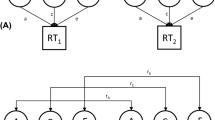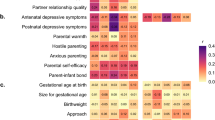Abstract
It was recently found that differences between monozygotic twins in the general factor of personality were positively correlated with differences in adulthood recollections of maternal and paternal affection. The current study used data from the Swedish Adoption/Twin Study on Aging to possibly replicate and extend these findings. The results were consistent with replication for monozygotic twin pairs who were reared together (base total of 166 pairs), but not for those who were reared apart (base total of 99 pairs). This finding suggests that the effect is due to the relative and not absolute aspects of the familial environment during childhood. Additionally, the general factor of personality was not shown to mediate childhood and adulthood family cohesion. These results suggest that the general factor of personality may have independent effects on recollections of childhood family cohesion and current family cohesion. Thus, both how family dynamics are related to the development of the general factor of personality and how the general factor of personality impacts adulthood family relations (e.g., parenting) are important areas of future inquiry.
Similar content being viewed by others
References
Asendorpf, J. B., Conner, M., De Fruyt, F., De Houwer, J., Denissen, J. J. A., Fiedler, K., . . . Wicherts, J. M. (2013). Recommendations of increasing replicability in psychology. European Journal of Personality, 27, 108–119.
Barbaro, N., Boutwell, B. B., Barnes, J. C., & Shackelford, T. K. (2017). Rethinking the transmission gap: What behavioral genetics and evolutionary psychology mean for attachment theory: a comment on Verhage et al. Psychological Bulletin, 143, 107–113.
Beaver, K. M. (2013). Biosocial criminology: a primer (2nd ed.). Dubuque, IA: Kendall/Hunt.
Belsky, J., Steinberg, L., & Draper, P. (1991). Childhood experience, interpersonal development, and reproductive strategy: an evolutionary theory of socialization. Child Development, 62, 647–670.
Benoit, D., & Parker, K. C. H. (1994). Stability and transmission of attachment across three generations. Child Development, 65, 1444–1456.
Bergeman, C. S., Chipuer, H. M., Plomin, R., Pederson, N. L., McClearn, G. E., Nesselroade, J. R., Costa Jr., P. T., & McCrae, R. R. (1993). Genetic and environmental effects on openness to experience, agreeableness, and conscientiousness: an adoption/twin study. Journal of Personality, 61, 159–179.
Briffa, M., Sneddon, L. U., & Wilson, A. J. (2015). Animal personality as a cause and consequence of contest behavior. Biological Letters, 11, 20141007. https://doi.org/10.1098/rsbl.2014.1007.
Cassibba, R., Coppola, G., Sette, G., Curci, A., & Costantini, A. (2017). The transmission of attachment across three generations: a study in adulthood. Developmental Psychology, 53, 396–405.
Copping, L. T., Campbell, A., & Muncer, S. (2014). Psychometrics and life history theory: The structure and validity of the High K Strategy Scale. Evolutionary Psychology, 12, 200–222. https://doi.org/10.1177/147470491401200115.
Dunkel, C. S., Harbke, C. R., & Papini, D. R. (2009). Direct and indirect effects of birth order on personality and identity: support for the null hypothesis. Journal of GeneticPsychology, 170, 159–175.
Dunkel, C. S., Cabeza de Baca, T., Woodley of Menie, M. A., & Fernandes, H. B. F. (2014). The general factor of personality and general intelligence: testing hypotheses from Differential-K, life history theory, and strategic differentiation-integration effort. Personality and Individual Differences, 62, 13–17.
Dunkel, C. S., Mathes, E. W., Kesselring, S. N., Decker, M. L., & Kelts, D. J. (2015). Parenting influence on the development of life history strategy. Evolution and Human Behavior, 36, 374–378.
Dunkel, C. S., Van der Linden, D., Brown, N., & Mathes, E. (2016). Self-report based general factor of personality as socially desirable responding, positive self-evaluation, and social-effectiveness. Personality and Individual Differences, 92, 143–147.
Dunkel, C. S., Nedelec, J. L., & Van der Linden, D. (2018). Using monozygotic twin differences to examine the relationship between parental affection and personality: a life history account. Evolution and Human Behavior, 39, 52–58.
Ellis, B. J., Bates, J. E., Dodge, K. A., Fergusson, D. M., Horwood, L. J., Pettit, G. S., & Woodward, L. (2003). Does father absence place daughters at special risk for early sexual activity and teen pregnancy? Child Development, 74, 801–821.
Fearon, P., Shmueli-Goetz, Y., Viding, E., Fonagy, P., & Plomin, R. (2014). Genetic and environmental influences on adolescent attachment. Journal of Child Psychology and Psychiatry, 55, 1033–1041.
Figueredo, A. J., Vásquez, G., Brumbach, B. H., & Schneider, S. M. R. (2004). The heritability of life history strategy: the K-factor, covitality, and personality. Social Biology, 51, 121–143.
Garvus-Ion, A., Sjøvold, T., Hernández, A., González-José, R., Torné, M.E.E., Martínez-Abadías, N., Esparza, M. (2017). Measuring fitness heritability: life history traits versus morphological traits in humans. American Journal of Physical Anthropology https://doi.org/10.1002/ajpa.23271, (Advance on-line publication).
Jenkins, J. M., Rasbash, J., & O'Connor, T. G. (2003). The role of the shared family context in differential parenting. Developmental Psychology, 39, 99–113.
Jokela, M., Pekkarinen, T., Sarvimäki, M., Terviö, M., & Uusitalo, R. (2017). Secular rise in economically valuable personality traits. Proceedings of the National Academy of Sciences, 114, 6527–6532.
Loehlin, J. C., & Horn, J. M. (2012). How general is the “general factor of personality”? Evidence from the Texas Adoption Project. Journal of Research in Personality, 46, 655–663.
Moos, R. H., & Moos, B. S. (1981). Family environment scale manual. Palo Alto, CA: Consulting Psychologists Press.
Pedersen, N. L Swedish Adoption/Twin Study on Aging (SATSA). (1984, 1987, 1990, 1993, 2004, 2007, & 2010). ICPSR03843-v2. Ann Arbor, MI: Inter-university Consortium for Political and Social Research [distributor], 2015-05-13. https://doi.org/10.3886/ICPSR03843.v2.
Pedersen, N. L., Plomin, R., McClearn, G. E., & Friberg, L. (1988). Neuroticism, extraversion, and related traits in adult twins reared apart and reared together. Journal of Personality and Social Psychology, 55, 950–957.
Pedersen, N. L., McClearn, G. E., Plomin, R., Nesselroade, J. R., Berg, S., & DeFaire, U. (1991). The Swedish Adoption Twin Study of Aging: an update. Acta Genaticae Medicae et Gemellologiae, 40, 7–20.
Penke, L., Denissen, J. J. A., & Miller, G. (2007). The evolutionary genetics of personality. European Journal of Personality, 21, 549–587.
Plomin, R., McClearn, G. E., Pedersen, N. L., Nesselroade, J. R., & Bergeman, C. S. (1988). Genetic influence on childhood family environment perceived retrospectively from the last half of the life span. Developmental Psychology, 24, 738–745.
Preacher, K. J., & Leonardelli, G. J. (2010-2018). Calculation for the Sobel test: an interaction calculation tool for mediation tests. http://www.quantpsy.org/sobel/sobel.htm
Robinson, O. C., Fredrick, G., & Ramos, K. (2014). Parental antipathy and neglect: relations with Big Five personality traits, cross-context trait variability and authenticity. Personality and Individual Differences, 56, 180–185.
Rovine, M. J. (1994). Estimating nonshared environment using sibling discrepancy scores. In E. M. Hetherington, D. Reiss, & R. Plomin (Eds.), Separate social worlds of siblings: the impact of nonshared environment on development (pp. 33–61). New Jersey: Lawrence Erlbaum Associates.
Rushton, J. P., & Irwing, P. (2011). The general factor of personality: normal and abnormal. In T. Chamorro-Premuzic, S. von Stumm, & A. Furnham (Eds.), The Wiley-Blackwell Handbook of Individual Differences (pp. 132–161). London: Wiley-Blackwell.
Rushton, J. P., Bons, T. A., & Hur, Y. (2008). The genetics and evolution of a general factor of personality. Journal of Research in Personality, 42, 1173–1185.
Rushton, J. P., Bons, T. A., Ando, J., Hur, Y. -M., Irwing, P., Vernon, P. A., Petrides, K. V., & Barbaranelli, C. (2009). A general factor of personality from multitrait-multimethod data and cross-national twins. Twin Research and Human Genetics, 12, 356–365.
Sulloway, F. J. (2001). Birth order, sibling competition, and human behavior. In H. R. Holcomb III (Ed.), Conceptual challenges in evolutionay psychology: innovative research strategies (pp. 39–83). Dordrecht and Boston: Kluwer Academic Publishers.
Van der Akker, A. L., Deković, M., Asscher, J., & Prinzie, P. (2014). Mean-level personality development across childhood and adolescence: a temporary defiance of the maturity principle and bidirectional associations with parenting. Journal of Personality and Social Psychology, 107, 736–750.
Van der Linden, D., Te Nijenhuis, J., & Bakker, A. B. (2010). The general factor of personality: a meta-analysis and a criterion-related validity study. Journal of Research in Personality, 44, 315–327.
Van der Linden, D., Dunkel, C.S., & Petrides, K.V. (2016). The General Factor of Personality (GFP) as social effectiveness: review of the literature. Personality and Individual Differences, 101, 98–105.
Van der Linden, D., Pekaar, K., Bakker, A., Aitken Schermer, J., Vernon, P. A., Dunkel, C. S., & Petrides, K. V. (2017). Overlap between the general factor of personality and emotional intelligence: a meta-analysis. Psychological Bulletin, 143, 36–52.
Van der Linden, D., Schermer, J. A., Dunkel, C. S., Pekaar, K. A., Bakker, A. B., Vernon, P. A., & Petrides, K. V. (2018). Overlap between the general factor of personality and trait emotional intelligence: a genetic correlation study. Behavioral Genetics, 48, 147–154.
Verhage, M. L., Schuengel, C., Madigan, S., Fearon, R. M. P., Oosterman, M., Cassibba, R., et al. (2016). Narrowing the transmission gap: a synthesis of three decades of research on intergenerational transmission of attachment. Psychological Bulletin, 142, 337–366.
Verweij, K. J., Yang, J., Lahti, J., Veiiola, J., Hintsanen, M., Pulkki-Raback, L., et al. (2012). Maintenance of genetic variation in human personality: testing evolutionary models by estimating heritability due to common causal variants and investigating the effect of distant inbreeding. Evolution, 66, 3238–3251.
Author information
Authors and Affiliations
Corresponding author
Ethics declarations
Conflict of Interest
The authors declare that they have no conflict of interest.
Rights and permissions
About this article
Cite this article
Dunkel, C.S., van der Linden, D., Fullerton, E.I. et al. Family Cohesion and the General Factor of Personality: Examining Differences in Monozygotic Twin Pairs. Evolutionary Psychological Science 4, 384–390 (2018). https://doi.org/10.1007/s40806-018-0149-5
Published:
Issue Date:
DOI: https://doi.org/10.1007/s40806-018-0149-5




